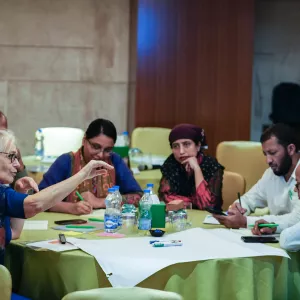Strengthening capacity for food systems transformation: Lessons from SHiFT
Globally, food systems are failing to provide sustainable healthy diets for all. Several paths towards food systems transformation have been identified. What remains unclear, however, is what transformative capacities are needed to support stakeholders in implementing effective changes that promote healthier and more sustainable food systems. From 2022 to 2024, the CGIAR Research Initiative on Sustainable Healthy Diets through Food

Strengthening capacity for food systems transformation: Lessons from SHiFT
Globally, food systems are failing to provide sustainable healthy diets for all. Several paths towards food systems transformation have been identified. What remains unclear, however, is what transformative capacities are needed to support stakeholders in implementing effective changes that promote healthier and more sustainable food systems.
From 2022 to 2024, the CGIAR Research Initiative on Sustainable Healthy Diets through Food Systems Transformation (SHiFT) worked in Bangladesh, Ethiopia, and Viet Nam to support food system actors in advancing country-led transformation toward sustainable healthy diets. In partnership with national stakeholders, SHiFT co-designed and delivered targeted capacity strengthening interventions in each country. This included organizational capacity assessments and a hybrid Training of Trainers (ToT) program, which combined an e-course on food systems governance with participatory online sessions and a face-to-face training workshop.
Through this work, SHiFT identified a need for tailored, inclusive, and adaptive capacity strengthening approaches. Reflecting on these experiences, SHiFT researchers from Wageningen Social & Economic Research (WSER) synthesized lessons learned in a recent working paper, highlighting seven guiding principles for delivering capacity strengthening in similar contexts.
Seven principles for effective capacity strengthening
- Contextualize in the political economy landscape
Tailor capacity strengthening efforts to the national context by grounding them in local food system commitments and political structures. For example, SHiFT’s work in Viet Nam aligned with the country’s National Action Plan, while efforts in Ethiopia focused on supporting the new Food Systems Manual, a key component in building national and subnational capacity to implement the Ethiopian Food Systems Transformation and Nutrition strategy.
1. Know your participants
Design experiential learning journeys that target participants who can influence decision making and support food systems transformation. By applying adult learning principles to an action-reflection cycle and connecting theoretical knowledge and practical exercises, participants are equipped to readily apply new skills.
2. Time interventions strategically
Align activities with periods of political and institutional possibility. Delivering capacity strengthening during times of upheaval, like contested elections or conflict, reduces its longer-term impact as a pathway for food systems transformation.
3. Work with power dynamics
Recognize inter- and intra-organizational tensions, such as competition between sectors or hierarchy-based conflicts. Rather than avoiding these dynamics, facilitators can use friction creatively, fostering transparency and clarity, leading to more productive partnerships.
4. Embrace emergence
Remain flexible and responsive to needs that emerge throughout implementation. Each country-based learning journey is unique, and facilitators must adapt in real-time to participant questions and group dynamics. This means that facilitating diverse learning journeys requires a specific facilitation skill set, style, and experience.
5. Engage with diversity
Include a wide range of perspectives to optimize the learning process. Pay special attention to hard-to-reach groups, for example the private sector, to ensure their needs and interests are equally represented in the collective knowledge generated by the group.
6. Stimulate agency and personal leadership
Encourage self-awareness, empathy, and visioning among all participants, not just high-level decision makers. Supporting individuals in realizing their personal capacity for leadership is essential for cultivating change agents who can drive food systems transformation across all levels.
Alongside these principles, SHiFT emphasized the importance of co-creation, iterative reflection, and flexibility. These elements ensure that capacity strengthening activities are not only technically sound, but deeply rooted in local contexts. Most importantly, focusing on agency and leadership development equips food system actors to initiate and sustain meaningful change.
This work contributes to a growing body of evidence on how targeted capacity strengthening can help stakeholders drive food systems transformation, bringing sustainable healthy diets within reach.
For more insights from SHiFT, read the full paper at https://hdl.handle.net/10568/173230.
The International Food Policy Research Institute and the Alliance of Bioversity International and CIAT lead SHiFT in close collaboration with Wageningen University and Research and with contributions from the International Potato Center. SHiFT combines high-quality nutritional and social science research capacity with development partnerships to generate innovative, robust solutions that contribute to healthier, more sustainable dietary choices and consumption of sustainable healthy diets. It builds on CGIAR’s unparalleled track record of agricultural research for development, including ten years of work on food systems and nutrition under the CGIAR Research Program on Agriculture for Nutrition and Health.
Header image: SHiFT workshop in Bangladesh. Credit: Zubiar Hossain

